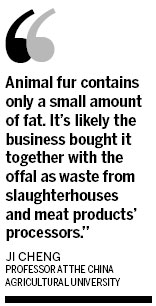16 on trial for illegal cooking oil sales
Case the largest of its kind since penalties for crime were clarified
Sixteen suspects stood trial on Monday accused of manufacturing and selling illegal cooking oil that contained waste oil and oil extracted from animal byproducts, including fox fur and chicken feathers.
The oil was sold to more than 100 food enterprises in five provinces and municipalities for about 60 million yuan ($9.8 million). The case is considered the largest of its kind since the Supreme People's Court and the Supreme People's Procuratorate unveiled a judicial explanation of dealing with criminal cases that endanger food safety in May.
The case was heard in a court in Lianyungang, Jiangsu province.
The prosecutor said Jiangsu Kangrun, a private enterprise that specializes in the production of food ingredients, produced the "edible oil" with waste oil and leftover pieces of offal and poultry purchased in Zhejiang province from January 2011 to March 2012.
The waste oil was made of fat from chickens, ducks, pigs, cattle and foxes.
The oil was then blended and bleached in the company's factory in Taolin, a town in Lianyungang.
"Animal fur contains only a small amount of fat. It's likely the business bought it together with the offal as waste from slaughterhouses and meat products' processors," said Ji Cheng, a professor at the College of Animal Science and Technology of the China Agricultural University.
Four of the defendants were senior managers of the company, and the remainder provided the raw materials.
The four managers had a clear division of labor, including purchasing, production management, instructing workers and sales.
They sold the illegal oil to 117 large- and medium-scale edible oil and food processing enterprises and private food stores.
Those enterprises include Anhui Huiyang Food, which mainly produces instant noodles; Chongqing Hongjiujiu, which specializes in the production of soup base for hotpots; and Beijing Salion Foods Co, a Sino-Japanese joint venture that manufactures seasonings.
Most food products made with the questionable oil are believed to have gone to the market, according to food industry experts.
The Lianyungang Intermediate People's Court did not announce a verdict on Monday and the trial will continue on Tuesday.
Food safety experts said consuming such oil endangers the gastrointestinal tract and can induce lethal diseases in the long term.
"It could cause cancers when the toxic and harmful substances accumulate in the human body and destroy the white blood cells and digestive tract. It will also increase the risk of heart disease, diabetes and Alzheimer's," said Fan Zhihong, an associate professor of nutrition and food safety at the China Agricultural University.
The company claims on its website that it is a high-tech food enterprise that has produced animal fat and bone soup since 1992. It supplies raw materials to producers of instant noodles, seasonings, frozen food and dairy products, and the website said some of its products are exported to Japan, South Korea and Hong Kong Special Administrative Region.

Chinese authorities have carried out a string of crackdowns in recent years on the production and sale of "gutter oil", or illegally recycled cooking oil.
The oil is often scooped from sewage drains and gutters behind restaurants and resold. Some of the oil is refined from low-quality pork and animal offal as well as oil overused for fried food.
According to the Supreme People's Court, 1,533 cases of manufacturing and selling poisonous and harmful food, including "gutter oil", were heard in courts on the mainland from 2010 to 2012, with last year's cases numbering more than 10 times those in 2010.
In April, the two prime culprits of a group of 20 people allegedly processing recycled cooking oil and selling it were sentenced to life imprisonment by the Ningbo Intermediate People's Court in Zhejiang province, and the rest received jail sentences ranging from seven to 11 years.
The case was the largest involving the underground business of gutter oil. Those concerned had made more than 99 million yuan in illegal income since December 2007.
Experts endorsed the crackdown on food safety crimes in the production process because it stops illegal behavior as it is happening.
"Tests are not perfectly reliable to disqualify an illegal oil, as lawbreakers are skilled at copying established standards and will find various ways to hide problems in their products and make them appear qualified," said Feng Ping, chief engineer at the China Meat Research Center.
zhouwenting@chinadaily.com.cn
Registration Number: 130349



























